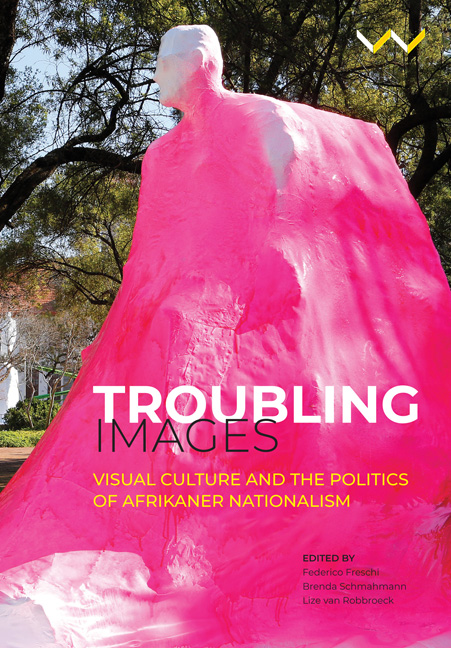Book contents
- Frontmatter
- Contents
- Acknowledgements
- List of Illustrations
- Troubling Images: An Introduction
- 1 The Trajectory and Dynamics of Afrikaner Nationalism in the Twentieth Century: An Overview
- One Assent and Dissent Through Fine Art and Architecture
- Two Sculptures on University Campuses
- Three Photography, Identity and Nationhood
- Four Deploying Mass Media and Popular Visual Culture
- Contributor Biographies
- Index
9 - Anton van Wouw’s Noitjie van die Onderveld, Afrikaner Nationalism and the Construction of the Volksmoeder Discourse
Published online by Cambridge University Press: 21 March 2020
- Frontmatter
- Contents
- Acknowledgements
- List of Illustrations
- Troubling Images: An Introduction
- 1 The Trajectory and Dynamics of Afrikaner Nationalism in the Twentieth Century: An Overview
- One Assent and Dissent Through Fine Art and Architecture
- Two Sculptures on University Campuses
- Three Photography, Identity and Nationhood
- Four Deploying Mass Media and Popular Visual Culture
- Contributor Biographies
- Index
Summary
‘Nou kom die tyd van die vrou aan!’ [The time of the woman has arrived!]. With these melodramatic words, Mabel Malherbe (1879–1964) announced the arrival of the first Afrikaans women's magazine, Die Boerevrou. This dramatic statement in the editorial of its first edition is followed by an urgent call to all Afrikaans women to be educated as mothers, for the benefit of their children, but ultimately also for the benefit of the fledgling new nation, the Afrikaner volk.
The magazine was first published in March 1919, a time when two seemingly contradictory trends may be discerned regarding the position of Afrikaans women in South Africa. On the one hand, many new organisations and actions in the preceding decade suggested that Afrikaans women were formally starting to organise themselves in spheres in which, traditionally, they had simply been tolerated informally: women were entering the labour market; they were launching political parties and women's organisations; they successfully organised a major political protest march; to a limited extent they became involved in or exposed to the suffrage movement; and they were active in a major public celebration in which women themselves were honoured.
On the other hand, these moves into the public sphere were, paradoxically, accompanied by a deliberate retreat into the domestic sphere – a second trend. Women workers converged in particular employment sectors related to their domestic roles, which did not conflict with established views about their natural abilities. The women's political parties did not take up the issue of women's suffrage, and initially the Transvaal Women's National Party even explicitly opposed the idea. The most powerful women's organisation in the Transvaal, the Suid-Afrikaanse Vroue Federasie [South African Women's Federation], went so far as to formally announce its departure from the political arena.
While the first trend was indicative of gender becoming an issue, with women exploring other spheres in search of a new identity and new roles, the latter was closely associated with the first traces of a new gender discourse, the volksmoeder [mother of the nation] discourse, which, in response to this issue of gender, would seek to create a new identity and new roles for Afrikaans-speaking women.
- Type
- Chapter
- Information
- Troubling ImagesVisual Culture and the Politics of Afrikaner Nationalism, pp. 219 - 247Publisher: Wits University PressPrint publication year: 2020



